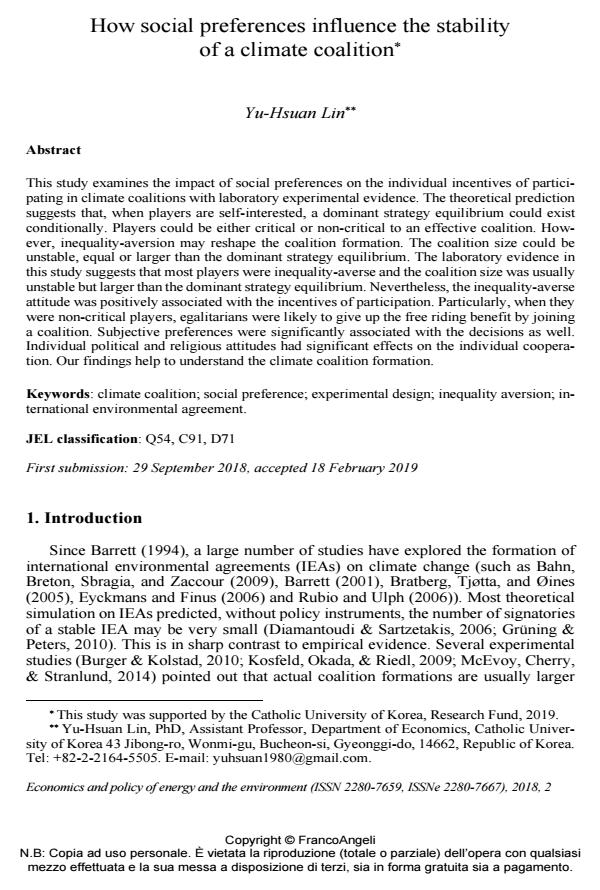How social preferences influence the stability of a climate coalition
Titolo Rivista ECONOMICS AND POLICY OF ENERGY AND THE ENVIRONMENT
Autori/Curatori Yu-Hsuan Lin
Anno di pubblicazione 2019 Fascicolo 2018/2
Lingua Inglese Numero pagine 16 P. 151-166 Dimensione file 244 KB
DOI 10.3280/EFE2018-002008
Il DOI è il codice a barre della proprietà intellettuale: per saperne di più
clicca qui
Qui sotto puoi vedere in anteprima la prima pagina di questo articolo.
Se questo articolo ti interessa, lo puoi acquistare (e scaricare in formato pdf) seguendo le facili indicazioni per acquistare il download credit. Acquista Download Credits per scaricare questo Articolo in formato PDF

FrancoAngeli è membro della Publishers International Linking Association, Inc (PILA), associazione indipendente e non profit per facilitare (attraverso i servizi tecnologici implementati da CrossRef.org) l’accesso degli studiosi ai contenuti digitali nelle pubblicazioni professionali e scientifiche.
This study examines the impact of social preferences on the individual incentives of participating in climate coalitions with laboratory experimental evidence. The theoretical prediction suggests that, when players are self-interested, a dominant strategy equilibrium could exist conditionally. Players could be either critical or non-critical to an effective coalition. However, inequality-aversion may reshape the coalition formation. The coalition size could be unstable, equal or larger than the dominant strategy equilibrium. The laboratory evidence in this study suggests that most players were inequality-averse and the coalition size was usually unstable but larger than the dominant strategy equilibrium. Nevertheless, the inequality-averse attitude was positively associated with the incentives of participation. Particularly, when they were non-critical players, egalitarians were likely to give up the free riding benefit by joining a coalition. Subjective preferences were significantly associated with the decisions as well. Individual political and religious attitudes had significant effects on the individual cooperation. Our findings help to understand the climate coalition formation.
Parole chiave:Climate coalition; social preference; experimental design; inequality aversion; international environmental agreement.
Jel codes:Q54, C91, D71
- Mapping the empirical relationship between environmental performance and social preferences: Evidence from macro data Marco Vincenzi, in ECONOMICS AND POLICY OF ENERGY AND THE ENVIRONMENT 1/2023 pp.85
DOI: 10.3280/EFE2023-001005
Yu-Hsuan Lin, How social preferences influence the stability of a climate coalition in "ECONOMICS AND POLICY OF ENERGY AND THE ENVIRONMENT" 2/2018, pp 151-166, DOI: 10.3280/EFE2018-002008